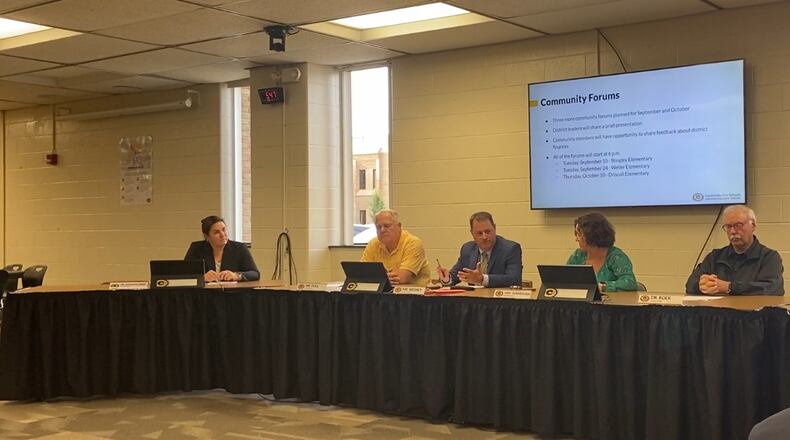Some cuts would be implemented immediately, with others not starting until the 2025-2026 school year.
The district said Wednesday that it was “unable to provide a cost savings at this time.”
The list of proposed cuts started with mention of a plan to “reduce additional positions based on enrollment needs,” but it did not say how many staff might be affected or in what areas.
The district did say class sizes would increase at all levels due to staffing reductions if the levy was rejected, and elective course offerings would be reduced.
Board President Allison Durnbaugh said proposed cuts to extracurriculars are evidence that the district will cut deeper than ever if the November levy is rejected.
“I think a lot of our extracurricular and elective offerings are what make Centerville Centerville, and I think that’s where it’s going to be felt,” Durnbaugh said. “The class size increase is another big one that I think is is going to really be felt, especially at our lower levels, and unfortunately that’s something we just can’t quantify yet, because of the timing and the number of unknowns that go into these.”
There was a long list of busing reductions, starting with sports teams, arts and clubs having to provide their own transportation to games, events, performances starting this winter.
Among other changes for 2025-26, busing would be eliminated for all high school and School of Possibilities students. For all younger grades, only students more than two miles from their school would have bus eligibility. Preschool transportation would be offered only to students who have a disability.
For 2025-26, the district would cut sports teams down to one team per level (7th, 8th, 9th, JV, and varsity teams) where some sports currently have multiple teams.
The district would eliminate “supplemental contracts” at elementary and middle schools that pay teachers and others a stipend to run certain clubs and extracurricular activities. And they would reduce those contracts at the high school.
Immediate cuts for fine arts if the levy is rejected would include reducing the number of remaining 2024-25 performances and increasing pay-to-participate fees. The changes for 2025-26 would include reducing or eliminating music and theater performance groups at the high school as well as supplemental contracts for K-8 music performances.
Credit: Contributed
Credit: Contributed
School district officials said the Voyager after-school program also would be closed at the end of 2024-25 school year if the levy is rejected.
Parents do pay a monthly fee if their child is enrolled in Voyager, a program with 300 K-5 students, the district confirmed.
“The monthly fee does cover much of the program’s cost,” district spokeswoman Sarah Swan told this news outlet. “However, there are still costs to the district, such as managing payroll and worker’s compensation, overhead costs for facilities, utilities, and custodians, and liability insurance”
The district also would reevaluate the school resource officer contracts (with Centerville police and the Montgomery County Sheriff’s Office) and the South Community Positive Health Options program.
District officials said the reduction plan is subject to change based on retirements and resignations, changes to enrollment, or other circumstances. But they said any changes will be presented to the board and community.
District officials say passage of the tax levy “would help the district continue to provide comprehensive supports, services, and programming, pursue further implementation of the strategic plan, and keep up with rising costs related to day-to-day operating expenses.”
Centerville resident Paul Szewczyk expressed criticized focusing on the impact reductions would have on residents and suggested staffers do more to help the district.
“I would be more inclined to support this if the Centerville Classroom Teachers Association said, ‘We’re not taking only a 0% increase,’ because they’re not getting raises in a contract, but they still get ... other benefits. They’re still getting their step adjustments, so really they’re not at zero.”
Kelli Peters, who attended Tuesday’s school board meeting, said in the situation the school district is in, the school board did the right thing by trying to protect the core classroom, but seeing and hearing about the reductions is “a gut punch.”
“I don’t have kids in the district any longer, but I know what my kids got out of some of these things that are being cut and it makes me really, really sad for any future generations, because it’ll take a long time to recover from this if these cuts have to happen,” she said. “And it makes me sad for those generations that they won’t have the opportunity to participate in these activities, like I watched so many, including my own, participate in.
.”
Voters rejected tax levies in November 2023 and March 2024, then Centerville Schools enacted a reduction plan that district leaders said saved about $3.5 million from the district’s operating fund. This included cutting 48 teaching and support staff positions, about 4% of the full-time staff, as well as increasing fees and building/athletic field rental costs.
Centerville school voters last approved a new tax for additional day-to-day operations funding in 2019. Some local districts have approved levies more recently, including Oakwood (2023), Kettering (2022) and Bellbrook (2021). Others have gone much longer without additional new local operating money, including Northmont (2016), Miamisburg (2010) and Springboro (2005).
About the Author


